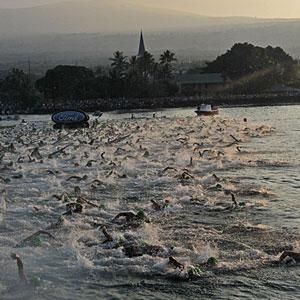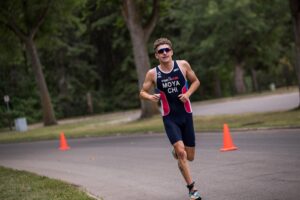Interview with swim death author

The most popular article on the Washington Post's online site right now is "Deaths in triathlons may not be so mysterious; panic attacks may be to blame." This has been the case almost continually over the three days since the article first appeared.
Its author is David Brown, a physician, a regular writer for the post, and a triathlete. A follow-up to the article is a print Q&A, also in the Post, that generated a lot of interest and questions.
While this may seem an aberrant year, in fact deaths in the water in triathlon do occur more frequently than they did in prior decades, and not just because triathlon is a bigger sport. They also, it seems to me, occur at a much higher rate per the number of competitors. I wrote about this in 2008, when, as early as July, there were 8 deaths year-to-date. The New York Times wrote about it back then.
As Dr. Brown notes in his Post article, a trade group in which I'm involved, Triathlon America, is looking at this issue right now, and I anticipate we'll have a set of best practices to present at our annual conference February 17-19 upcoming, in North San Diego County.
I interviewed Dr. Brown about his article, and here are his responses.
Slowtwitch: I think you and I both prefer, by training and nature, for our conclusions to be driven by, or consistent with, sufficient criteria to determine causation. But in this case, you and I both are casting about for causation, using our intuition, along with personal experience and anecdotes from others. Obviously it's hard to devise an experiment here. That doesn't lessen the urgency to find a common thread that ties deaths in triathlon together. While I think panic attacks may in fact be a common thread, are you mindful of the lack of anything science-worthy to hang your hat on when forming your conclusion?
David Brown: There has been very little research on the cause of death of swimmers in triathlons other than the autopsies that are performed on nearly all the victims. The details of those autopsies are generally not available to the public although the one-sentence "manner and cause of death" generally is. In my opinion there needs to be some very basic epidemiology done about this problem. What is the sex, age, experience, training, co-existing medical conditions, medications used, etc. in these cases? As to my hypothesis that panic attacks underlie most of them, the first question that needs to be answered is how common panic attacks are among triathletes. This can only be determined by conducting statistically valid surveys. I personally think that for at least a while races should have mandatory pre-race meetings in which one of the conditions of getting the colored band on your wrist is filling out anonymously a two- or three-sentence survey about whether the competitor has ever had what he or she considers a panic attack during a race, whether the person has ever had to change swim strategy (such as floating on the back and letting the pack go by) in response to panicky feelings, and whether the competitor has ever aborted a race because of such feelings. In addition, I think everyone who drops out of a race in any of the legs should be formally debriefed to find out why they decided to stop and what was happening in the minutes preceding the decision (and anything else the competitor might think relevant). An agreement to undergo this brief interview or to answer a questionnaire should be an explicit and clearly displayed condition that the athlete agrees to when he or she signs the waiver at the time of registration. I think there should be a low threshhold for sending to the emergency room people who drop out of the swim and are clearly breathless and in a not-normal condition. Only with an X-ray and some other tests is it possible to determine whether any of these people have "swimming-induced pulmonary edema", a highly unusual and poorly understood condition mostly seen in military rescue and combat swimmers.
There is a saying in medicine: "If you don't measure it, you can't change it." It seems to me that any attempt to try to reduce these deaths begins with measurement. That said, it may be difficult to "prove" that panic attacks are the most common cause of these events. But a lot more information can be gathered to throw light on the causes.
ST: In your own, personal, triathlon racing experience, and in the course of your interviews with others, did you consider the question of whether those complaining of a panic attack engaged in a warm-up, in the water, prior to the commencement of the swim?
David Brown: I did not ask the relatives of the people who died whether they knew whether the person warmed up in the water before the race. There should be a formal protocol of questions asked of relatives and witnesses after a death or close call, and this question could be part of it.
ST: You mentioned that there were 9 deaths you could uncover that took place in triathlon in the United States this year. And that 8 of them occurred in the water. But there is one other commonality. All 9 deaths occurred during the first leg of a multisport event. That might seem counterintuitive, because the most arduous segment of a triathlon would seem, at face value, to be the last. I therefore wonder whether the common thread is going from zero-to-sixty in a much bigger hurry than is typical in training. This is not mutually exclusive with the panic attack theory, just that perhaps this strident burst of energy from relative rest manifests itself differently on land than in the water: panic attack and drowning in the water, heart attack on the bike or in the run. Did the first-event hypothesis cross your mind when investigating this?
David Brown: I think the fact that the swim is the first event and is the one with the most jarring sensation—wet and cold—has something to do with the higher risk of this part of the multisport event. But I don't think the "burst of energy" theory is likely to be correct, for two reasons. I would suspect that most of the people who died did not go out especially hard. I doubt if they were testing their physical limits. I know from my experience and talking with many triathletes that panic attacks often occur soon after starting when nobody but a few aggressive leaders is going very hard or is even able to keep up a consistent, unbroken rhythm. The second reason is that even if people were pushing themselves "too hard" that is a situation that doesn't result in death. Lots of people have started out in running or bike races at an unsustainable pace and without adequate warmup. They slow down, either voluntarily or involuntarily. But they don't die or have fatal cardiac events.
ST: Did you inquire of the water temperatures of the races in which the deaths occurred? Is it your feeling that water temps below a certain threshold are an important consideration?
David Brown: Good question and one that should be part of a more systematic inquiry into these deaths. I did not ask about water temperature. I only spoke with one race director of a fatal triathlon, the one at Dewey Beach, Del.; the widow of the victim did not want to talk I had only a passing reference to him.
ST: You're a medical man. Let's talk prophylaxis. I don't note any conclusions, or suggestions, in your article. Did you, as a result of your investigation, or have you since, compiled a set of best practices specific to this issue that attend one's participation in a triathlon?
David Brown: I believe all races should have mandatory pre-race meetings in which panic attacks are talked about in a non-judgmental way, with perhaps a few short clips of experienced swimmers testifying as to their existence. I think advice should be given about strategies for calming oneself during a race when this happens. Again, advice from an accomplished swimmer, as long as it's clear, might be the best way to transmit that information. Placing rescue boats, kayakers, etc., in strategic places early in the swim, and telling competitors where they will be, would be useful. (Putting a couple of these in the direct line of the pack might be useful, so people who are not at the edge will have easy access to them). I think every race should have a policy that anyone who drops out in the swim will automatically get into the race the next year without paying an entrance fee. There may be some other strategies, too, but these are ones that have come to mind. However, none of them have ben proved useful. If one wanted to be truly scientific, some races should introduce these "interventions" and other races should do what they are doing now "standard care" just like a scientific study, and then compare the two.







Start the discussion at forum.slowtwitch.com